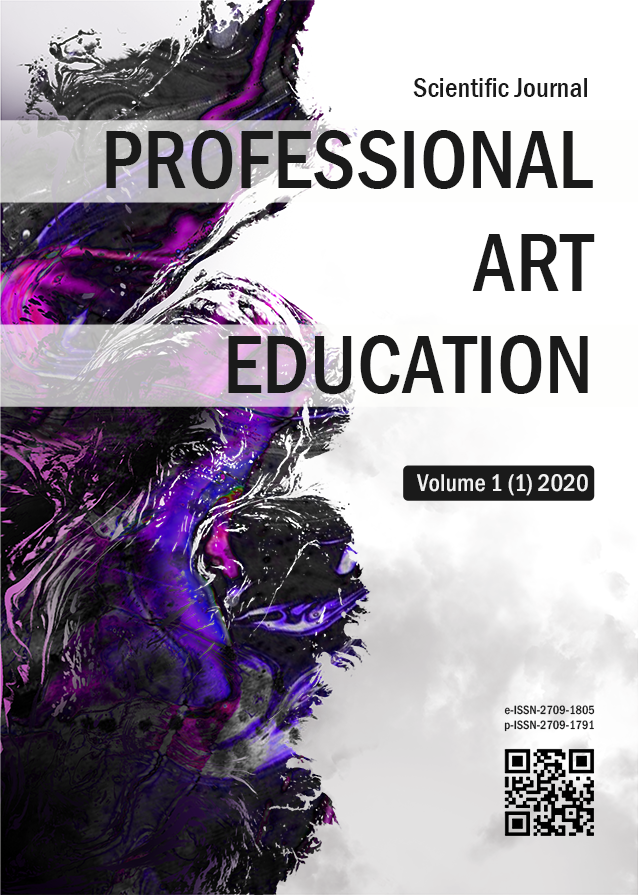Formation of National Self-Consciousness of Future Music Art Teachers in «Choral Class»
DOI:
https://doi.org/10.34142/27091805.2020.1.01.05Keywords:
national education, Taras Shevchenko, choral works, Ukrainian composers, future teachers of musical artAbstract
Object. The article addresses issues of educating future music teachers, the formation of their national worldview, in which professional knowledge and professional responsibility are formed, are of great importance. The leading role in this direction belongs to the discipline “Choral Class” and the widespread use of choral works written in poetry by Taras Shevchenko. Methods. Traditional historical and pedagogical research methods were used in the work: analytical, historical, and comparative, retrospective, comparative analysis of scientific and pedagogical literature, educational materials. Results. It was revealed that the literary works of Taras Shevchenko were interpreted in their choral works by such famous Ukrainian composers as M. Verbitsky, L. Dychko, M. Karminsky, A. KosAnatolsky, O. Kosits, M. Lysenko, S. Lyudkevich, L. Revutsky, K. Stetsenko, A. Shtogarenko and others.
This is since choral music is precisely the spiritual center that for centuries has kept the “genetic code” of Ukrainian culture. The work of the great poet T. Shevchenko has not lost its relevance today. He is dear to us with a word that does not die and exalts the beauty of the Ukrainian nation, awakens the best human feelings, encourages friendship and creative cooperation around the world, teaches us to love Ukraine. Given this, a significant role in the national education of future music teachers is played by the development of choral works by Ukrainian composers based on poems by Taras Shevchenko in the classes of the “Choir Class”. Studying the works of A. Kos-Anatolsky, Y. Stepova, A. Shtogarenko and others, written in poems by T. Shevchenko, in the classes of the «Choir Clas»”, students can not only understand the social significance of the feelings of both the poet and composers, but also experience that or other artistic image. This contributes to the development of the personal emotional sphere of students, their spirituality, reflection. Conclusions. Mastering the above compositions teaches future music teachers how pure and honest, humane and truthful, hardworking and sociable, full of self-worth and respect for all who work, a real person should be. Taras Shevchenko’s сreativity, increased by the skill of Ukrainian composers, brings to young people the educational potential aimed
at educating the national consciousness, educating patriotism of national dignity, spiritual enrichment of the individual.
Downloads
References
Андрос, Н. (1985). Музична інтерпретація поезії Шевченка: (на матеріалі хорових творів укр. рад. композиторів). Київ: Музична Україна, 72 с.
Васильєва, О. (2013). Підготовка майбутніх вчителів музичного мистецтва до практики роботи з хором. Час мистецької освіти: зб. наук. праць 1 Міжнародна науково-практична конференція. Харків: ХНПУ ім. Г.С.Сковороди, 273-276.
Гордейчук, Н. (1956). Творчество Тараса Шевченко в русской музыке. Из истории русско-украинских музыкальных связей. Москва: Музгиз, 203-212.
Жаровська, О.П. (2014). Національна самосвідомість як складова патріотичного виховання студентів педагогічних університетів. Теоретико-методичні проблеми виховання дітей та учнівської молоді. Вип. 18(1). 233-242. Режим доступу: http://nbuv.gov.ua/UJRN/Tmpvd_2014_18%281%29__28
Зелінська, Є. (2009). Національна самосвідомість та фактори її формування. Філософські проблеми гуманітарних наук. Філософські проблеми гуманітарних наук. Режим доступу : http://www.info-library.com.ua/books-text-11405.html
Козицький, П. (1965). Тарас Шевченко і музика. Шевченко і музика. Київ: Мистецтво, 5-18.
Королюк, Н. (1994). Кобзарева пісня : поезія Тараса Шевченка і музика. Київ : Фонд мистецтв «Юні таланти», 76 с.
Пархоменко-Тимофієва, Л. Т. (1964). Шевченко і українська музика. Українська мова і література в школі. Київ, № 5. 33-40.
Погребенник, В. (2004). «Україна в антоновім огні»: ідейно-тематичний комплекс української поезії ХІХ – ХХ століття. Сучасний погляд на літературу. Режим доступу: http://enpuir.npu.edu.ua/handle/123456789/26734
Приходько, Ю.О., Юрченко, В.І. (2012). Психологічний словник-довідник: Навчальний посібник. Київ: Каравела, 328 с.
Стеценко, К. Г. (1981). Спогади, листи, матеріали. Київ: Музична Україна, 480 с.
Любченко, А. (упор.). (1989). Хорові твори на вірші Тараса Шевченка. Київ: Музична Україна.
Якубяк, В. (1964). Музикальність Шевченка. Тези доповідей VI-ої звітної наукової конференції. Дрогобич: Дрогобицький держ. пед. інститут ім. І. Франка. 180-182
Downloads
Published
License
Copyright (c) 2020 Соколова Алла Вікторівна (Автор)

This work is licensed under a Creative Commons Attribution-NonCommercial 4.0 International License.















